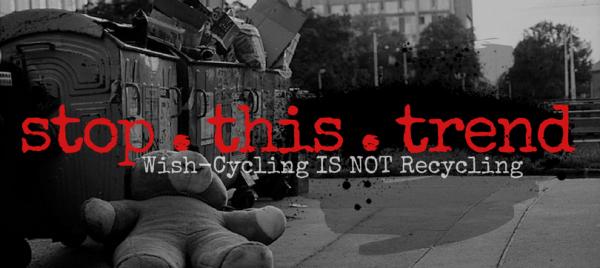The wishcycling illusion, and what will worsen it
Spoiler: one of the greatest buzzwords of the moment.

Many of us, more or less daily, look at their domestic waste, think for a moment “Is this recyclable?” and then throw it in the recycling bin, hoping someone, somewhere, will sort it out. That makes of us “wishcyclers”, that is people who “want to do the right thing and feel that the more that they can recycle, the better."
Reality is different: a global recyclying meltdown is happening, and in that meltdown wishcycling does more harm than good (*).
Basically, any recycling system in which recyclables go into one or a few bins and separated later, somewhere else, is a “contaminated system”.
This can happen because the system itself is flawed to begin with. Very often, however, the problem is us:
- Too many of us just throw into their “recycling” bins stuff that should had never be there. At least, in the specific recycling system of their own city. What is recyclable in one town may not be so in the next one
- We know too little about how theoretically recyclable objects contaminate each other: for example, when paper gets wet because you threw in the same bin some still dripping container for liquids, it is not recyclable anymore
This was already making the inefficiency and costs of recycling grow well over what is acceptable. In some cases, says that article, “For every ton of material we get in, there’s 500 pounds of trash that has to be taken out of it”.
Then, in 2018, things became much worst: China stopped accepting 24 materials, including mixed plastics, largely because the goods they received were too contaminated to recycle them. Countries like Turkey, Vietnam and Indonesia are taking up some of the business, but they just can’t handle the same amount of trash that we sent to China.
For individuals, there is only one solution, of course
First, if you aren’t sure something is recyclable, just throw it in the trash. Second, don’t just recycle: reduce and reuse as much as you can.
Third, just refuse stupid, non-interoperable products.
Fourth, since anything with microelectronics inside becomes almost surely unrecyclable… Please please please demand regulations that reduce and reuse as much as possible of the new plastic that is already submerging us.
Image sources:
(*) that article is about the US, but it is valid with almost no modification worldwide.
Who writes this, why, and how to help
I am Marco Fioretti, tech writer and aspiring polymath doing human-digital research and popularization.
I do it because YOUR civil rights and the quality of YOUR life depend every year more on how software is used AROUND you.
To this end, I have already shared more than a million words on this blog, without any paywall or user tracking, and am sharing the next million through a newsletter, also without any paywall.
The more direct support I get, the more I can continue to inform for free parents, teachers, decision makers, and everybody else who should know more stuff like this. You can support me with paid subscriptions to my newsletter, donations via PayPal (mfioretti@nexaima.net) or LiberaPay, or in any of the other ways listed here.THANKS for your support!